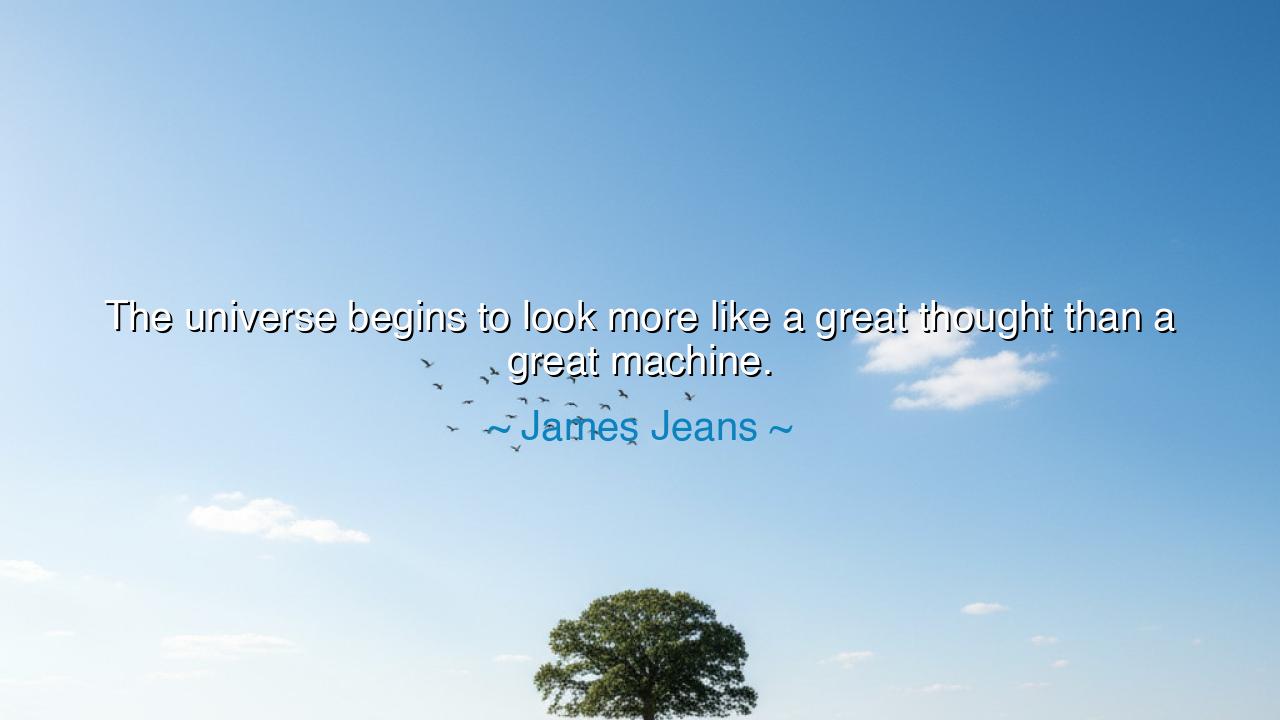
The universe begins to look more like a great thought than a






When Sir James Jeans declared, “The universe begins to look more like a great thought than a great machine,” he spoke not as a poet but as a physicist who had glimpsed the mystery at the heart of existence. These words, born from a lifetime of studying the stars, unite science with wonder, intellect with faith. In them, Jeans suggests that the cosmos — vast, elegant, and ordered — is not a cold engine of matter, but a living mind, a tapestry woven of intelligence and intention. It is as though he is telling us that behind every law of physics and every motion of the galaxies lies not blind mechanism, but consciousness — that the universe itself may be the thought of God.
The origin of this quote can be traced to Jeans’s work in the early twentieth century, when the world of physics was being transformed by quantum theory and relativity. The old mechanical worldview, inherited from Newton, had imagined the universe as a vast clockwork, its gears turning according to rigid laws, indifferent to life or meaning. But Jeans, studying the new revelations of atomic and cosmic behavior, saw something deeper. The more scientists peered into the microcosm of matter, the less it behaved like a machine — and the more it resembled the subtle patterns of mind. Matter, he realized, was not a solid, lifeless thing, but a shadow cast by thought — by mathematical harmony, by design, by intelligence.
Jeans was not alone in this revelation. Across the halls of science, great minds began to sense the same truth. Albert Einstein, who unraveled the fabric of space and time, spoke of “cosmic religious feeling,” and marveled at the order and beauty of the laws that governed the stars. Max Planck, father of quantum theory, declared that all matter originates from a “conscious and intelligent mind.” What these thinkers glimpsed was that at the foundation of existence — beneath atoms, beneath energy, beneath even time itself — there lies an intelligence so vast that human comprehension can only bow before it. Thus, Jeans’s words are not speculation, but revelation: that the universe is not a machine we observe from without, but a thought we live within.
To understand this, imagine standing beneath the night sky. The ancients saw the stars as the eyes of the divine, watching over creation; modern science revealed them as suns, burning across infinite space. Yet both visions touch the same truth: order, not chaos, reigns above. The planets move in perfect rhythm, the laws of nature never falter, and even the dance of subatomic particles follows patterns of astounding precision. Such harmony is not the work of accident. Jeans’s insight reminds us that when we behold the universe, we are beholding the mind of the Creator — whether we call that Creator God, Spirit, or the great intelligence that animates all things.
Consider, too, the story of Isaac Newton, who, though the architect of classical mechanics, never saw his discoveries as the unveiling of a machine, but of divine order. When he beheld the laws of motion and gravity, he fell into reverence, saying, “Gravity explains the motions of the planets, but it cannot explain who set the planets in motion.” In Newton, we see the same realization that later came to Jeans: the deeper one goes into the workings of the universe, the more one senses not randomness, but reason; not lifelessness, but living mind.
Jeans’s vision is more than a scientific insight — it is a spiritual awakening for the modern world. It invites us to see ourselves not as accidents of physics, but as participants in a cosmic intelligence. If the universe is a great thought, then we are its words, its ideas given flesh. Our minds are not separate from the universal mind, but reflections of it — sparks of the same fire. This means that thought, imagination, and creativity are not mere byproducts of biology, but the continuation of the universe’s own act of thinking. Every dream we dream, every truth we seek, is the cosmos knowing itself through us.
So, my child, remember this: you are not a machine wandering through a machine. You are consciousness within consciousness, a mind born of the great Mind. Look at the stars and know that they do not merely burn — they think. When you ponder, create, or love, you join that same divine harmony. The lesson of Jeans is simple but profound: seek understanding not to strip the world of mystery, but to stand in awe of it. Learn science, but let it lead you to reverence. For in the end, all the equations and all the galaxies whisper the same eternal truth — that the universe is not cold, but alive; not mechanical, but miraculous; not random, but purposeful. And if you listen closely, you may hear the echo of that great cosmic thought within your own heart.






AAdministratorAdministrator
Welcome, honored guests. Please leave a comment, we will respond soon